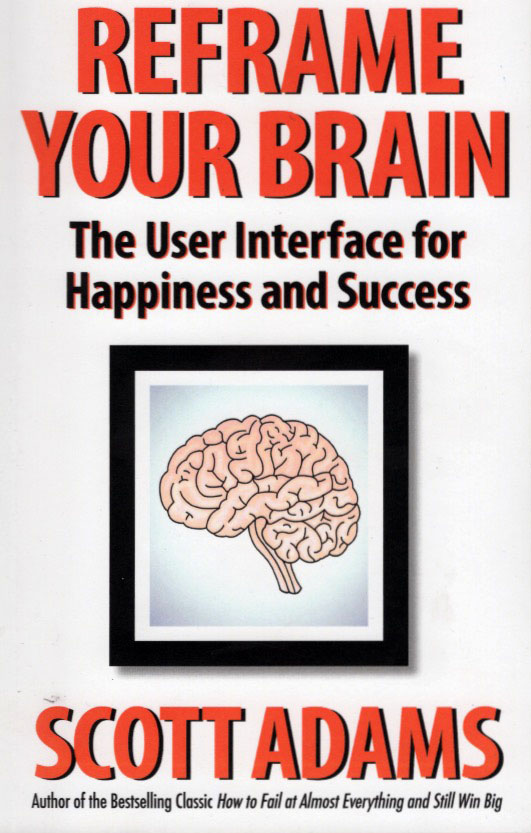 Nov 15, 2023–My 8-year-old grand taught me a life lesson on the way to her dental appointment.
Nov 15, 2023–My 8-year-old grand taught me a life lesson on the way to her dental appointment.
She couldn’t wait.
Like most of you, going to the dentist is right up there with getting tased while standing in a puddle of stagnant water.
So I asked her why she was excited.
“It’s just more fun than going to the eye doctor,” was her non sequitur answer.
But what she had just done was create a reframe.
This struck deep for me because I just started reading Scott Adams’ newest book “Reframe Your Brain.” Adams is best known as creator of the comic Dilbert, but he is also a trained hypnotist and political guru who has built a large online audience. His thesis is that you can change your life simply by reframing how your brain perceives everything.
Sound complicated? No, it is simple.
Which is probably one of the first examples of reframing: make the complicated simple. Adams practices this by writing everything in terms understandable to a 5th-grader. (That’s surprisingly difficult to do; which is why I treat my readers as if you were 8th-graders.)
Here are a few samples of how Adams suggests you “reframe your brain:”
Usual Frame: Alcohol is a beverage.
Reframe: Alcohol is poison.
This was how he gave up drinking.
Usual Frame: I fail at 90% of things I try.
Reframe: I only need to succeed 10% of the time.
Usual Frame: I hate this repetitive chore.
Reframe: How can I make this chore into a game?
I used this while working as a prep cook in a restaurant in college. My “chore” was cutting stems off radishes. What took the most time was the wasted motion of pivoting and picking up radishes from the bucket, cutting the stems, dumping them in the trash, then placing the clean radishes in a different container. Remembering those marble mazes from childhood, I set up a series of ramps and chutes where I could sit in one place, slice off the stems, and simply let them drop into the proper starting chute. Voila! The radishes rolled off into their bucket while the stems slid into the trash bin. I was laughing, watching it work. My manager didn’t think it was funny. That reaction reinforces Adams’ next reframe:
Usual Frame: Hard work will be rewarded.
Reframe: The illusion of hard work will be rewarded.
By making a menial task fun, it entertained me. My mistake was doing it where my boss could see it. If something is fun, it’s not work. If you’re not doing “work,” you are not a good employee. I didn’t work there long after.
Reframing also helps you be more productive. The simplest model is that you should structure your day so as to accomplish your most demanding work at the time when you feel the most energetic. Hence:
Usual Frame: Manage your time.
Reframe: Manage your energy.
So if you are more creative in the morning, that’s when you paint. If you are physically active in late afternoon, that’s when you exercise.
Here’s one I used when my kids came home dejected because they failed a test or got trounced on the tennis court. My reaction? Great! Now you have something to work on.
Usual Frame: I’m depressed because I lost.
Reframe: I’m energized because now I know exactly what I need to do to get better.
My absolute favorite reframe of Adams’ is one that I discovered at mid-life and wish I had embraced earlier.
Usual Frame: My life is stagnating.
Reframe: I am not embarrassing myself enough.
At those moments in everyone’s life when you feel bored, or stuck, or unchallenged, or content, or perhaps intimidated and afraid you will be ridiculed by peers–in other words, most vulnerable–is exactly when you should “embrace embarrassment.”
I’ve often said the only reason I continue to learn new useless skills is because I don’t care if I look silly in public. There are only two outcomes when you embarrass yourself: 1) you’ll succeed and acquire a valuable new skill, or 2) you’ll fail brilliantly and have a funny story to tell. Again, the reframe: both outcomes are desirable.
(Interestingly, those who do you mock you are the ones who never try anything new themselves. Think high school.)
You are using reframes already. Some common sayings reflect our drive to turn sour grapes into wine (there is a reframe right there). Others are
It’s darkest before the dawn
Life isn’t fair
The customer is always right
When a door closes, a window opens
None of these are strictly true, but using them reframes what would otherwise be an uncomfortable experience.
I actually tried my grand’s reframe about going to the dentist. On arriving for a cleaning, rather than cringing in the waiting room, I charged into the office with a smile and arms waving, and positively squealed, “I am so excited to be here this morning! I can’t wait to have you scrape my teeth and make my gums bleed! But I’ll walk out with squeaky clean teeth!”
Other than disconcerting the receptionist and startling the sweet lady in the waiting room, it sort of worked.
I also now have switched dentists.